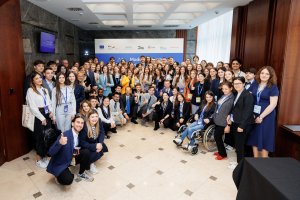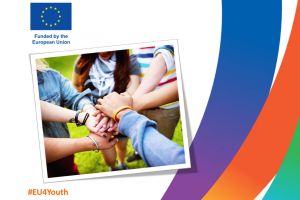
The EU publishes important results under the Skills4Jobs Programme
On July 15, the world celebrates Youth Skills Day, highlighting the importance of developing young people and equipping them with modern knowledge and skills. This motivation drives the European Union to implement various programmes and initiatives in Georgia.
One of the most notable and large-scale EU programmes is Skills4Jobs. Launched in its second phase in Georgia in 2019, this programme has funded 9 projects with a total of €7 million, yielding impressive results, including:
- 1 741 job seekers employed
- 6 505 job seekers trained in core skills, entrepreneurship, and IT
- 9 236 job seekers benefitted from tailored assistance and skills-building
- 1 108 internships provided
- 26 new demand driven vocational education and training programmes in various fields
- 15 vocational education and training institutions assisted in programme development.
- 19 career guidance and employment centres created
- 4 health and safety courses introduced in higher education institutions
- 90 public schools and 10 vocational education and training institutions created youth coding and tech entrepreneurial clubs
This is an incomplete list of achievements that participants in the Skills4Jobs programme benefitted from across 8 regions of Georgia(Autonomous Republic of Adjara, Guria, Samegrelo-Zemo Svaneti, Racha-Lechkhumi and Kvemo Svaneti, Imereti, Shida Kartli, Kvemo Kartli, Kakheti,). Within the framework of the Skills4Jobs project, multiple employment forums were held in various cities, numerous training sessions were organised, and hundreds of people completed short-term professional education courses to enhance their skills.
The goal of the 9 implemented projects is to assist thousands of Georgian citizens in finding jobs by matching their skills to the labour market requirements, a major challenge for Georgia’s competitiveness and economic growth. These projects address this goal by strengthening quality vocational education and training (VET), improving continuing education opportunities, and promoting entrepreneurship. The programme ensured the involvement of all stakeholders, including the private sector and the state, making the results more tangible.
The second phase of the Skills4Jobs programme will conclude this year. The EU, as Georgia’s partner and largest donor, remains committed to supporting the development of highly qualified, in-demand personnel and advancing the country’s progress.
Employment centers established with the EU support
Boosting employment in Georgia
First professional steps together with the EU
EU-funded TechClubs in Kakheti region
EU support to youth employment – Lasha Lominadze
EU support to youth employment – Lela Vanadze
EU support to youth employment – Nika Bejuashvili

Advancing Youth Engagement in Georgia: EU4Youth Hosts Capacity Building and Award Ceremony for Youth CSOs

EU brings the Bookshelf European Edition to Georgia’s regions, engaging youth in interactive learning
Projects

EU4Youth: Youth Engagement and Empowerment

EU4Youth: Youth Employment and Entrepreneurship

United for Georgia’s European Way – fostering nationwide civil society engagement and democratic oversight of Georgia’s European integration process

Strengthening Understanding of European Policies through High Quality Education - Scholarship Scheme for Eastern Partners at the College of Europe, Natolin














